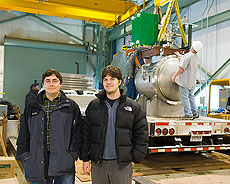ArgoNeuT detector, collaborators resurface

ArgoNeuT Spokesperson Mitch Soderberg and graduate student Josh Spitz accompanied the ArgoNeuT detector to the MINOS hall.
Almost every weekday since January 2009, Yale graduate student Josh Spitz has gotten his hands dirty taking care of the liquid argon ArgoNeuT detector. He has worked 350 feet underground, piecing together parts and going to check on it one, two or three times a day.
"You have to have everything working very well to keep that liquid argon cold and the detector happy," Spitz said. "We would measure the purity of the liquid argon, listen for strange noises and make sure everything was running smoothly."
This month, he can finally focus on the fruits of his and other collaborators' labor: the first few thousand records of low-energy neutrino and antineutrino interactions detected using liquid argon.
The ArgoNeuT collaboration ended the test experiment's physics run of a little more than five months on Feb. 22 and removed the detector from the MINOS underground hall.
"ArgoNeuT has benefited enormously from the efforts of many talented members of the Fermilab community," said ArgoNeuT Spokesperson Mitch Soderberg. "We couldn't have pulled this off without their help."
ArgoNeuT, which stands for the Argon Neutrino Test project, is the first liquid-argon detector of its kind to study low-energy neutrino interactions. Scientists hope to build on their experiences with the 170-liter liquid argon detector with a new experiment, the 89-ton MicroBooNE detector.
"ArgoNeuT is a test in that sense," Spitz said. "But it's able to do important physics measurements as well, which is impressive, given the size of the detector."
Spitz is one of four graduate students who will use data from ArgoNeuT to write their theses.
Participating in the small, 20-member collaboration means being involved in almost every aspect of design, construction, maintenance, commissioning, data-collecting and now analysis. "ArgoNeuT was my first baby," Spitz said.
Now he gets to try the real thing; on March 2, he and his wife welcomed their first child, a daughter named Abigail.
-- Kathryn Grim
|